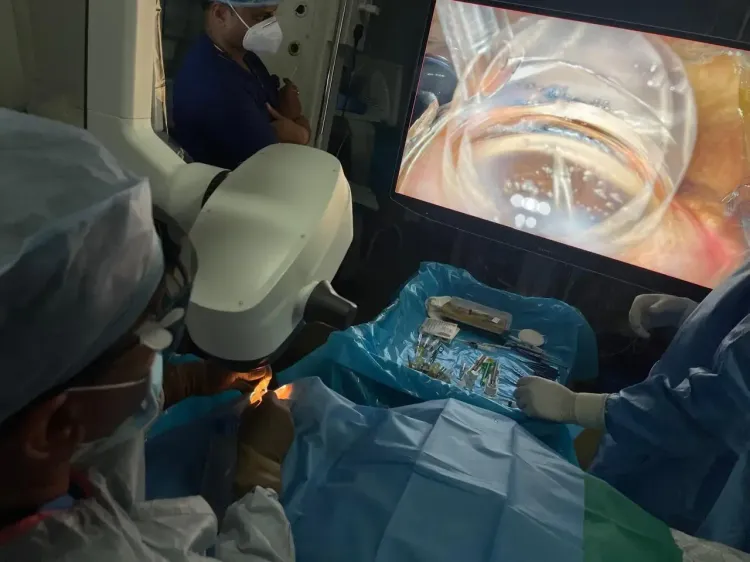Has the Army Hospital Achieved a Milestone with its First Minimally Invasive Glaucoma Surgery?

Synopsis
Key Takeaways
- Army Hospital has successfully performed its first minimally invasive glaucoma surgery.
- The surgery utilized advanced 3D microscope technology.
- Early detection of glaucoma is essential to prevent vision loss.
- At-risk individuals include those with diabetes, hypertension, and family history of glaucoma.
- Technology integration in healthcare enhances patient outcomes and safety.
New Delhi, April 27 (NationPress) In an unprecedented achievement for the Armed Forces, the Department of Ophthalmology at Army Hospital (Research and Referral), New Delhi, has successfully carried out its inaugural minimally invasive glaucoma surgery utilizing a state-of-the-art 3D microscope.
This advanced three-dimensional visualization system is instrumental for various eye surgeries, including treatments for squint, cataract, corneal issues, glaucoma, and retinal disorders, as stated by the Ministry of Defence.
The system employs specialized 3D polarisation glasses and a 55-inch 4K ultra-HD display.
Notable benefits of this technology include significantly reduced surgical time and complication rates compared to traditional microscopes, lower endoilluminator power requirements, diminished photo-toxicity, and enhanced ease of use in complex scenarios, resulting in high satisfaction ratings from surgeons and nursing staff.
“This initiative underscores the unwavering dedication of the Indian Army to providing superior medical services to our clientele in premier institutions,” remarked the ministry.
This facility is poised to deliver cutting-edge eye care services, augmenting the hospital's capacity to treat a diverse array of ocular conditions.
Health experts advise that adults in their 40s should undergo regular eye examinations to avoid vision impairment caused by glaucoma—a chronic condition that can result in blindness.
Dr. Tanuj Dada, a Professor of Ophthalmology and Head of Glaucoma Services at RP Centre for Ophthalmic Sciences at AIIMS, New Delhi, emphasized that early detection of glaucoma, which often shows no symptoms, is essential. Delay in diagnosis can lead to irreversible vision loss.
Individuals at heightened risk for glaucoma include those with “diabetes, hypertension, or a family history of glaucoma.”
“Those using steroids, creams, eye drops, tablets, or inhalers, or who have sustained eye injuries are also at increased risk for developing this condition,” the ophthalmologist stated.
Independent research and hospital data reveal that blindness due to glaucoma is on the rise in India, primarily due to a lack of awareness and delayed diagnosis, with the disease going undetected in approximately 90% of cases.









